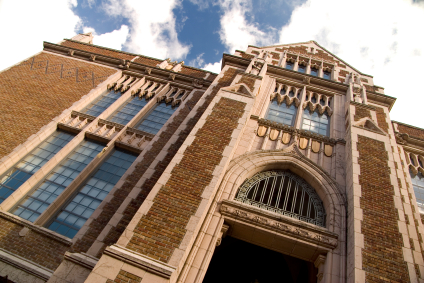By Kay Hwangbo
Spring is approaching, and with it the highly anticipated arrival of college acceptance letters. Nowhere is the anxiety level higher than among Korean American teens, who tend to think that the college they get into determines whether they will have a good life. When I was a reporter for the Korea Times English Edition in the early ’90s, I asked counselors at Los Angeles area high schools whether they thought Korean Americans were the most grade-conscious students. About half said yes, and the other half said that the Chinese, Vietnamese, Iranians and Jews were equally obsessed.
I remember the day that I got my acceptance letter from Harvard. I could feel my heart beating in my chest as I opened the letter. I breathed a sigh of relief when I read the first word – “Congratulations!” I called my mother at work. “Mom, I got into Harvard!” I exclaimed. She said softly, “Oh, Kay,” sounding happy and moved.
This was in mid-January of 1983, as I had applied early decision to Harvard. Flash forward to 2004, 21 years later. I am 39; my mother is 64. “Sending you to Harvard was just a vanity,” she said. “We couldn’t afford it. I don’t know what we were thinking.” About two years ago, my father half-jokingly said that they should have sent me to the University of Maryland (I grew up in Maryland), or the local community college.
[ad#336]
If you are gasping at this, it’s because you are a normal, kimchi-eating Korean American.
I don’t know whether my parents really think Harvard was a mistake, or whether they are just trying to “guilt” me into getting my life back on track. Either way, they are crushed that their “perfect” little girl didn’t become the Chief Justice of the Supreme Court, PTA president and Korean chef extraordinaire, as they had hoped. Right now, at least on paper, I don’t look very good.
I’m 44, single and an unemployed documentary filmmaker. I have been jobless for a year and a half. I was unemployed for all of 2006, and for a long stretch in 2004. When I wasn’t idle, I was working “below my capacity” as an accounting clerk or temp, ostensibly to support my film, but basically to heal from a semi-nervous breakdown. Ah, yes, the breakdown. In September 2003, after working pretty much nonstop for six years — in film school and on my current documentary — I realized that I just. Couldn’t. Work. I remember seeing a piece of trash on the living room floor, and barely being able to pick it up off the floor.
I was able to wash the dishes, pay the bills, and get myself over to shrink appointments, but that was it.
What happened? With the help of some heavy-duty therapy, I saw that almost everything in my life up until then had led up to that moment. I was your basic goody-two-shoes, nerdy kid all throughout school. I was your Korean American parent’s dream daughter, with the exception of being short, flat-chested as a teenager, and having only one sankapeol.
[ad#336]
I had internalized my parents’ values so much, I mistook them for my own. I wanted to go to the “best” college, after which I would go to law school. I was disappointed when I found out I couldn’t be the president of the United States, since I was born in Korea, so I settled on being Chief Justice. I assumed that I would marry someone rich, good-looking, nice, interesting and sexy, and I planned on having two boys and two girls.
So, did Harvard help make me successful? Did going to Harvard make me happy? Sorry to disappoint you, but no, and no.
I would like to say this to any young person who is trying to decide on a college: Try to figure out who you are, and what is going to work for you. Harvard wasn’t a good fit for me, but it might be a good fit for other people. Unfortunately, I wasn’t able to answer these questions for myself. My protective parents meant well, but they infantilized me. I assumed that they had all the answers.
Remember: You are 18 (or 22 or 27 or 32). You are an adult. You can define “success” or “happiness” for yourself. For some people, it’s being the best artist that they can be. For others, it’s fighting for social justice. For still others, it’s being financially “set” and having a high-status job.
Don’t get me wrong: I got a lot out of going to Harvard, including a great education. However, it didn’t really fit with my values or my needs. It was a rather cold, competitive place. There was a lot of emphasis on being the top “this” or best “that.” I had no self-awareness at the time, or I might have realized that I was emotionally fragile and needed a smaller, more nurturing environment.
The advantage of having a breakdown — going to the abyss and looking over the edge — is that I finally realized that I define “success” as “happiness,” and I define happiness as having good relationships, being creative, having a family of my own (still crossing my fingers on that one), and doing an honest day’s work.
I had to have my breakdown and deal with all that turmoil and pain. But hopefully, you’re not one of those people who have to be sadder, to be wiser.
[ad#336]








